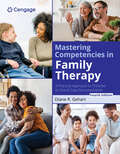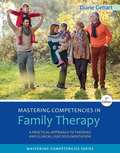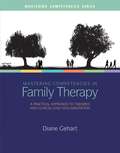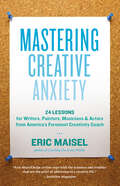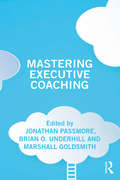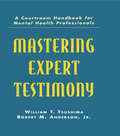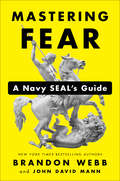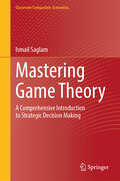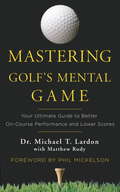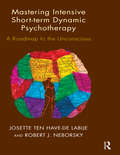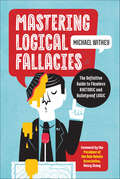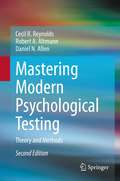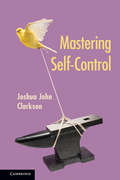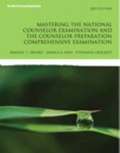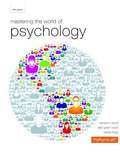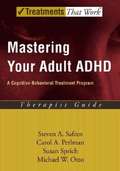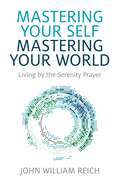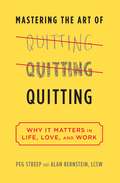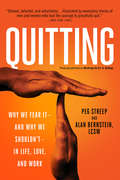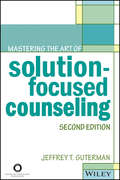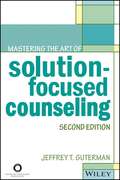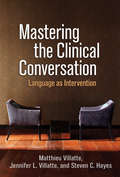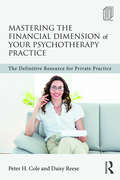- Table View
- List View
Mastering Communication with Seriously Ill Patients
by Walter Baile Anthony Back Robert Arnold James Tulsky Kelly Fryer-EdwardsPhysicians who care for patients with life-threatening illnesses face daunting communication challenges. Patients and family members can react to difficult news with sadness, distress, anger, or denial.
Mastering Competencies in Family Therapy: A Practical Approach to Theories and Clinical Case Documentation
by Diane R. GehartGehart's MASTERING COMPETENCIES IN FAMILY THERAPY: A PRACTICAL APPROACH TO THEORIES AND CLINICAL CASE DOCUMENTATION, 4th Edition, not only teaches you about family therapy theories, but also how to use them. A resource you will turn to again and again, it covers most of what you need to know in graduate school and to pass your licensing exams. Students love the book's relaxed, down-to-earth style that makes even complex concepts easy to understand, along with its real-world clinical forms -- case conceptualization and treatment planning -- that can be used with clients. Integrating diversity and research considerations into theoretical discussions and practical applications, the book provides a more holistic and nuanced understanding of couple and family therapy. The fourth edition is packed with the latest research, new theories, telehealth practices, licensure exam prep tips and more.
Mastering Competencies in Family Therapy: A Practical Approach to Theories and Clinical Case Documentation (Third Edition)
by Diane R. GehartMastering Competencies in Family Therapy, 3rd Edition provides a competency-based approach that introduces couple and family therapy theories while simultaneously teaching you how to complete clinical documentation. Using a light and inviting tone, Diane R. Gehart provides detailed instructions and examples that enable you to complete real-world clinical forms, which are incorporated into the text. Diversity and research considerations are integrated into theoretical discussions and practical applications to facilitate a more holistic and nuanced understanding of couple and family therapy.
Mastering Competencies in Family Therapy: Therapy A Practical Approach to Theories and Clinical Case Documentation, Second Edition
by Diane GehartMASTERING COMPETENCIES IN FAMILY THERAPY: A PRACTICAL APPROACH TO THEORY AND CLINICAL CASE DOCUMENTATION, 2nd Edition provides a competency-based approach to teaching clinical skills in marriage and family therapy-an approach adopted by the American Association for Marriage and Family Therapy (AAMFT). Using a light and inviting tone, author Diane R. Gehart offers a comprehensive five-step model for competent treatment, which guides readers through case conceptualization, clinical assessment (diagnosis) and case management, treatment planning, evaluation of progress, and documentation. The book also includes an introduction to the importance of theory and evidence-based practice in all five steps, and a set of useful clinical forms that can be applied in practice environments. Available with InfoTrac Student Collections http://gocengage.com/infotrac.
Mastering Creative Anxiety: 24 Lessons for Writers, Painters, Musicians, and Actors from America's Foremost Creativity Coach
by Eric MaiselIn his decades as a psychotherapist and creativity coach, Eric Maisel has found a common thread behind what often gets labeled “writer’s block,” “procrastination,” or “stage fright.” It’s the particular anxiety that, paradoxically, keeps creators from doing, completing, or sharing the work they are driven toward. This “creative anxiety” can take the form of avoiding the work, declaring it not good enough, or failing to market it — and it can cripple creators for decades, even lifetimes. But Maisel has learned what sets successful creators apart. He shares these strategies here, including artist-specific stress management; how to work despite bruised egos, day jobs, and other inevitable frustrations; and what not to do to deal with anxiety. Implementing these 24 lessons replaces the pain of not creating with the profound rewards of free artistic self-expression.
Mastering Executive Coaching
by Brian O. Underhill Marshall Goldsmith Jonathan PassmoreThis book aims to enrich the knowledge and toolkit of executive coaches and help them on their development path towards mastery. Edited by three leading practitioners, it brings together the expertise of an international range of Master Coaches, and provides evidence-based practical chapters across a broad range of topics, including contracting, ethical dilemmas, coaching board members and non-executive directors, and the use of psychometrics. Mastering Executive Coaching will be essential reading for executive coaches, consultants and trainers who are looking to develop their practice. It will also be highly relevant for Masters-level students of coaching and coaching psychology.
Mastering Expert Testimony: A Courtroom Handbook for Mental Health Professionals
by Robert M. Anderson William T. Tsushima Robert M. Anderson, Jr.The past two decades have seen a rapidly growing involvement of psychologists and psychiatrists in legal proceedings for criminal cases, divorces, and traffic and industrial accidents. Mental health professionals are traditionally not trained to cope with the legal responsibilities that arise from their routine clinical work and are eager to learn the professional skills that are needed in forensic settings. There is presently no book which focuses entirely on the strategies and verbal tactics employed by attorneys who critically examine and challenge the testimony of mental health professionals. If psychologists and psychiatrists can familiarize themselves with the kind of questions and verbal exchanges that take place in the courtroom, they would be better prepared to provide their expertise in an effective manner. This book fills that need. Designed as a practical handbook to assist practitioners from all mental health disciplines, it focuses on typical courtroom dialogue between attorneys and mental health professionals who testify regarding their psychotherapy clients and also those who are hired by attorneys specifically to provide expert opinions. The authors, who have extensive experience in the courtroom, offer well-thought-out, effective responses as contrasted with impulsive and weak answers to attorneys' queries. Actual cases are employed to illustrate typical challenges in various legal areas, including criminal law, child custody hearings, and personal injury cases. Certain forensic issues such as the scientific bases of expert opinions, the accuracy of psychological vs. medical tests, and malingering, are emphasized throughout the chapters. The book is based on the belief that exposure to courtroom dialogue enhances the awareness of appropriate professional responses to an attorney's cross-examination and greatly alleviates fear toward a situation well-known to provoke intense levels of anxiety. Although it is written alluding to the forensic psychologist or psychiatrist, the strategies for the witness are readily applicable in most instances to all mental health professionals. Issues such as therapist bias, unconfirmed observations, and cultural and ethnic factors are clearly relevant to all who provide mental health services.
Mastering Fear: A Navy SEAL's Guide
by John David Mann Brandon WebbFrom New York Times bestselling author and former Navy SEAL Brandon Webb comes a simple yet powerful five-step guide to transforming your life by making your fears work for you instead of against you.Brandon Webb has run life-threatening missions in the world's worst trouble spots, whether that meant jumping out of airplanes, taking down hostile ships on the open sea, or rolling prisoners in the dead of night in the mountains of Afghanistan. As a Navy SEAL, he learned how to manage the natural impulse to panic in the face of terrifying situations. As media CEO and national television commentator, he has learned how to apply those same skills in civilian life. Drawing on his experiences in combat and business, along with colorful anecdotes from his vast network of super-achiever friends from astronauts to billionaires, Webb shows how people from all walks of life can stretch and transcend their boundaries and learn to use their fears as fuel to achieve more than they ever thought possible. "Fear can be a set of manacles, holding you prisoner," writes Webb. "Or it can be a slingshot, catapulting you on to greatness."The key, says Webb, is not to fight fear or try to beat it back, but to embrace and harness it. In the process, rather than being your adversary, your fear becomes a secret weapon that allows you to triumph in even the most adverse situations. In Mastering Fear, Webb and his bestselling coauthor John David Mann break this transformation down into five practical steps, creating a must-read manual for anyone looking for greater courage and mastery in their lives.
Mastering Game Theory: A Comprehensive Introduction to Strategic Decision Making (Classroom Companion: Economics)
by Ismail SaglamThis book offers a comprehensive and accessible introduction to game theory, emphasizing both noncooperative and cooperative aspects of strategic decision-making. In the chapters on noncooperative game theory, you will explore advanced topics such as perfect equilibrium, evolutionary stable strategies, and correlated equilibrium, along with a range of subjects often underrepresented in other textbooks. The cooperative game theory sections cover essential topics like coalitional games, cake-cutting and fairness, cooperative bargaining, and matching theory. Additionally, the book includes an insightful chapter on mechanism design. Designed for use in one-semester advanced undergraduate or graduate-level courses, this textbook stands apart from others at the same level. Each chapter begins with clear theoretical definitions, followed by carefully detailed examples. Select chapters include propositions that either demonstrate the existence of equilibrium in abstract games or interrelate various game-theoretic concepts. While rigorous in its scope, the book assumes no advanced background in calculus or algebra. The mathematical exposition is kept as straightforward and self-contained as possible, ensuring that readers can easily apply theoretical ideas to practical examples and follow proofs with ease.
Mastering Golf's Mental Game
by Matthew Rudy Phil Mickleson Dr Michael T. LardonPerfect your mental approach to your game To be a golfer is to tinker--with everything from equipment to grip to swing. But one thing most players don't give enough attention to is the mental game. Psychologists aren't a new phenomenon in golf, but Dr. Michael Lardon is a different breed of performance coach. Instead of sending his players into a losing battle against emotion, indecision, and fear on the golf course, he shows them how to organize their thoughts and use them for maximum performance. His step-by-step Pre-Shot Pyramid provides any player with the ideal blueprint for shot setup. And his revolutionary Mental Scorecard will give you the tools to accurately measure what you really do on the golf course and how to make real, permanent improvements. You will learn the same techniques that Dr. Lardon shares with Phil Mickelson and dozens of other tour players, including the tools that helped Mickelson right himself after the 2012 U.S. Open to win the British Open a month later with a historic final round. Mastering Golf's Mental Game will change the way you think about golf, and is a must-read for any player serious about shooting better scores and getting more enjoyment out of the game.
Mastering Intensive Short-Term Dynamic Psychotherapy: A Roadmap to the Unconscious
by Robert J. Neborsky Josette Ten Have-De LabijeThis book evolved from the First International Meeting of the Experiential Dynamic Psychotherapy Association on intensive short-term dynamic psychotherapy. It will help readers to make use of the conscious working alliance with the patient to increase the unconscious part of the working alliance.
Mastering Logical Fallacies: The Definitive Guide to Flawless Rhetoric and Bulletproof Logic
by Michael Withey"If I have learned anything in ten years of formal debating, it is that arguments are no different: without a good understanding of the rules and tactics, you are likely to do poorly and be beaten."—HENRY ZHANG, President of the Yale Debate AssociationYour argument is valid and you know it; yet once again you find yourself leaving a debate feeling defeated and embarrassed. The matter is only made worse when you realize that your defeat came at the hands of someone's abuse of logic—and that with the right skills you could have won the argument.The ability to recognize logical fallacies when they occur is an essential life skill. Mastering Logical Fallacies is the clearest, boldest, and most systematic guide to dominating the rules and tactics of successful arguments. This book offers methodical breakdowns of the logical fallacies behind exceedingly common, yet detrimental, argumentative mistakes, and explores them through real life examples of logic-gone-wrong.Designed for those who are ready to gain the upper hand over their opponents, this master class teaches the necessary skills to identify your opponents' misuse of logic and construct effective, arguments that win. With the empowering strategies offered in Mastering Logical Fallacies you'll be able to reveal the slight-of-hand flaws in your challengers' rhetoric, and seize control of the argument with bulletproof logic.
Mastering Modern Psychological Testing: Theory and Methods
by Cecil R. Reynolds Daniel N. Allen Robert A. AltmannThis book provides a comprehensive introduction to psychological assessment and covers areas not typically addressed in existing test and measurements texts, such as neuropsychological assessment and the use of tests in forensics settings. The book introduces the vocabulary of the profession and the most basic mathematics of testing early as being fundamental to understanding the field. Numerous examples are drawn from tests that the authors have written or otherwise helped to develop, reflecting the authors’ deep understanding of these tests and their familiarity with problems encountered in test development, use, and interpretation. Following the introduction of the basic areas of psychometrics, the book moves to areas of testing that represent various approaches to measuring different psychological constructs (memory, language, executive function, etc.), with emphasis on the complex issue of cultural bias in testing. Examples of existing tests are given throughout the book; however, this book is not designed to prepare students to go out and administer, score, and interpret specific psychological tests. Rather, the purpose of this book is to provide the foundational core of knowledge about tests, measurement, and assessment constructs, issues, and quantitative tools.Explains what constitutes a psychological test, how tests are developed, how they are best used, and how to evaluate their strengths and weaknesses;Describes areas of testing that represent different approaches to measuring different psychological constructs;Explains applications of psychological testing to issues in the courts;Addresses how test authors and publishers design and research tests to address the difficult and demanding issues of cultural differences in test performance and interpretation of test results.
Mastering Self-Control
by Joshua John ClarksonGrounded in nearly a century of scientific research, Mastering Self Control is an academic 'how to' in the mastery of self control. Though most of us have an acute awareness of the goals we want to achieve, we have little insight into how we respond to questions central to successful goal attainment. What is a realistic goal? Can we turn intentions to actions? Why do we need a support system? It is within this context that this volume identifies a series of actionable strategies to push readers to master self-control and consequently optimize goal progress.
Mastering The National Counselor Exam And The Counselor Preparation Comprehensive Exam
by Danica G. Hays Bradley T. Erford Stephanie CrockettThis powerful resource and tool is designed specifically for students preparing for the National Counselor Exam (NCE) or Counselor Preparation Comprehensive Examination (CPCE) and professional counselors preparing to take the NCE as a licensure exam. It includes state-of-the-art summaries of essential core content, numerous sample questions, multiple-choice questions embedded in each content section, and four full-length practice tests: two for the NCE and two for the CPCE. A helpful introductory chapter provides test taking and study preparation strategies to help readers prepare for what to expect with either exam and how to prepare for the exams. Mastering the NCE and CPCE is the ideal tool for taking and passing the two most important examinations in counselor preparation and credentialing.
Mastering The World Of Psychology
by Samuel E. Wood Ellen Green Wood Denise BoydMastering the World of Psychology, 5/e, provides students with more support than ever before, thanks to the Survey, Question, Read, Recite, and Review Learning Method, or SQ3R, which is integrated throughout the text. SQ3R shows students the relationship between psychological theory and learning. It is the strongest and most comprehensive program for measuring progress and attaining successful outcomes in Introductory Psychology.
Mastering Your Adult ADHD A Cognitive-Behavioral Treatment Program
by Steven A. Safren Carol A. Perlman Susan Sprich Michael W. OttoUsed in conjunction with the corresponding client workbook, this therapist guide offers effective treatment strategies that follow an empirically-supported treatment approach. It provides clinicians with effective means of teaching clients skills that have been scientifically tested and shown to help adults cope with ADHD. The step-by-step, session-by-session descriptions are a practical resource for therapists who deliver the treatment to clients with ADHD. Together, the therapist guide and client workbook contain all of the information and materials necessary to delivery this treatment in the context of individual outpatient cognitive behavioral therapy.
Mastering Your Self, Mastering Your World: Living by the Serenity Prayer
by John William ReichOur lives are conducted within a dynamic, vibrant, but often challenging context of desirable, undesirable, and even threatening life experiences. A rewarding life in the face of these experiences depends on our ability to engage and maintain a sense of personal mastery as we go through life. Psychologists have uncovered some of the key principles of mastery-infused living. This book presents many examples of some of the key distinctions among our experiences in our daily living, highlighting how our well-being is centrally based on how we engage our personal mastery beliefs and actions in navigating these varied types of life experience. Studies show that mastery can be strengthened through training. A number of mastery-enhancing treatments have been developed in research and clinical practice and are presented here in an accessible format emphasizing how they can be adopted by the individual reader. These tests consistently show positive benefits for physical and mental health. Rethinking our lives and our experiences from a personal mastery template can be a key to a more successful life.
Mastering the Art of Quitting
by Peg Streep Lcsw Alan B. BernsteinFind out why the happiest, most successful people have the ability both to persist and to quit. In a culture that perceives quitting as a last resort and urges us to hang in, Mastering the Art of Quitting tackles our tendencies to overanalyze, ruminate, and put a positive spin on goals that have outlived their usefulness. Bestselling author Peg Streep and psychotherapist Alan Bernstein demonstrate that persistence alone isn't always the answer. We also need to be able to quit to get the most out of life. They reveal simple truths that apply to goal setting and achievement in all areas of life, including love, relationships, and work: Quitting promotes growth and learning, as well as the ability to frame new goals. Without the ability to give up, most people will end up in a discouraging loop. The most satisfied people know when it's time to stop persisting and start quitting. Quitting is a healthy, adaptive response when a goal can't be reached. Featuring compelling stories of people who successfully quit, along with helpful questionnaires and goal maps to guide you on the right path, Mastering the Art of Quitting allows you to evaluate whether your goals are working for or against you, and whether you need to rechart certain aspects of your life. When is it time to stop persisting and start quitting? Take a moment and answer the following questions. Just thinking about the answers will give you insight into your ability to quit artfully and restart your life. Do you believe that "winners never quit and quitters never win"? How realistic are you when it comes to setting goals? What matters more: staying the course or exploring new possibilities in life? How much of your sense of self relies on other people's judgments? Do you tend to hang in longer than you should, even when you're unhappy? When you try something new, do you focus on the effort you have to put in or the possibility of failure? Are you a procrastinator or a delayer when it comes to getting things done? How much do you worry about making a mistake? Do you second-guess yourself? How hard is it for you to get over a setback?
Mastering the Art of Quitting
by Peg Streep Alan BernsteinFind out why the happiest, most successful people have the ability both to persist and to quit. In a culture that perceives quitting as a last resort and urges us to hang in, Mastering the Art of Quitting tackles our tendencies to overanalyze, ruminate, and put a positive spin on goals that have outlived their usefulness. Bestselling author Peg Streep and psychotherapist Alan Bernstein demonstrate that persistence alone isn't always the answer. We also need to be able to quit to get the most out of life. They reveal simple truths that apply to goal setting and achievement in all areas of life, including love, relationships, and work: Quitting promotes growth and learning, as well as the ability to frame new goals. Without the ability to give up, most people will end up in a discouraging loop. The most satisfied people know when it's time to stop persisting and start quitting. Quitting is a healthy, adaptive response when a goal can't be reached. Featuring compelling stories of people who successfully quit, along with helpful questionnaires and goal maps to guide you on the right path, Mastering the Art of Quitting allows you to evaluate whether your goals are working for or against you, and whether you need to rechart certain aspects of your life. When is it time to stop persisting and start quitting? Take a moment and answer the following questions. Just thinking about the answers will give you insight into your ability to quit artfully and restart your life. Do you believe that "winners never quit and quitters never win"? How realistic are you when it comes to setting goals? What matters more: staying the course or exploring new possibilities in life? How much of your sense of self relies on other people's judgments? Do you tend to hang in longer than you should, even when you're unhappy? When you try something new, do you focus on the effort you have to put in or the possibility of failure? Are you a procrastinator or a delayer when it comes to getting things done? How much do you worry about making a mistake? Do you second-guess yourself? How hard is it for you to get over a setback?
Mastering the Art of Quitting: Why We Fear It -- and Why We Shouldn't -- in Life, Love, and Work
by Peg Streep Lcsw Alan B. BernsteinFind out why the happiest, most successful people have the ability both to persist and to quit Do you believe that "winners never quit and quitters never win"? Do you tend to hang in longer than you should, even when you're unhappy? Our culture usually defines quitting as admitting defeat, but persistence isn't always the answer: When a goal is no longer useful, we need to be able to quit to get the most out of life. In Quitting, bestselling author Peg Streep and psychotherapist Alan Bernstein reveal simple truths that apply to goal setting and achievement in all areas of life, including work, love, and relationships: Without the ability to give up, most people will end up in a discouraging loop. Quitting is a healthy, adaptive response when a goal can't be reached. Quitting permits growth and learning, as well as the ability to frame new goals. Featuring compelling stories of people who successfully quit, along with helpful questionnaires and goal maps to guide you on the right path, Quitting will help you evaluate whether your goals are working for or against you, and whether you need to let go in order to start anew.
Mastering the Art of Solution-Focused Counseling
by Jeffrey T. GutermanThe most current trends in solution-focused counseling are explored in the latest edition of this updated and expanded text. Dr. Guterman provides a comprehensive and straightforward discussion of solution-focused theory and describes how the model can be used throughout the therapeutic process. Clinical techniques and detailed case studies illustrate counseling with clients experiencing a range of problems, including depression, substance abuse, grief, morbid jealousy, and trichotillomania. New chapters and sections in this edition address anxiety, eating disorders, migraine headache, psychosis, spiritual and religious problems, self-injurious behavior, and suicide. Additional features include excerpts of dialogue from actual counseling sessions, sample forms and supplementary materials, and troubleshooting tips for getting unstuck in difficult cases. *Requests for digital versions from the ACA can be found on wiley.com. *To request print copies, please visit the ACA website here. *Reproduction requests for material from books published by ACA should be directed to permissions@counseling.org.
Mastering the Art of Solution-Focused Counseling, Second Edition
by Jeffrey T. GutermanThe most current trends in solution-focused counseling theory,research, and practice are explored in the latest edition of this updated and expanded text. Dr. Guterman provides a comprehensive and straightforward discussion of solution-focused theory and the stages of the model throughout the therapeutic process. By emphasizing solutions rather than problems, this approach helps clients to identify and harness their natural resources, strengths, and skills to promote positive change.
Mastering the Clinical Conversation
by Steven C. Hayes Matthieu Villatte Jennifer L. VillatteThis compelling book provides psychotherapists with evidence-based strategies for harnessing the power of language to free clients from life-constricting patterns and promote psychological flourishing. Grounded in relational frame theory (RFT), the volume shares innovative ways to enhance assessment and intervention using specific kinds of clinical conversations. Techniques are demonstrated for activating and shaping behavior change, building a flexible sense of self, fostering meaning and motivation, creating powerful experiential metaphors, and strengthening the therapeutic relationship. User-friendly features include more than 80 clinical vignettes with commentary by the authors, plus a "Quick Guide to Using RFT in Psychotherapy" filled with sample phrases and questions to ask.
Mastering the Financial Dimension of Your Psychotherapy Practice: The Definitive Resource for Private Practice
by Daisy Reese Peter H. ColeWritten by two therapists with extensive business experience, Mastering the Financial Dimension of Your Psychotherapy Practice addresses the clinical and financial challenges of establishing and maintaining a successful private practice. This book contains updated content on investing strategies, changes in the insurance marketplace, and trends in the marketing of a psychotherapy practice. The first of five sections explores the life cycle of the modern therapy practice, offering best business and investing practices for each phase. In the second and third sections, the authors consider the emotional dimension in the development of a private practice. The fourth section offers a basic course in financial planning, including an investigation into five common financial mistakes therapists make and various solutions to each situation. The fifth section is designed to offer a road map of actions to take in establishing a financial plan. Concluding the book is an inspirational discussion of how the therapist in private practice can create a career with meaning, fulfillment, personal satisfaction, and solid financial rewards.

